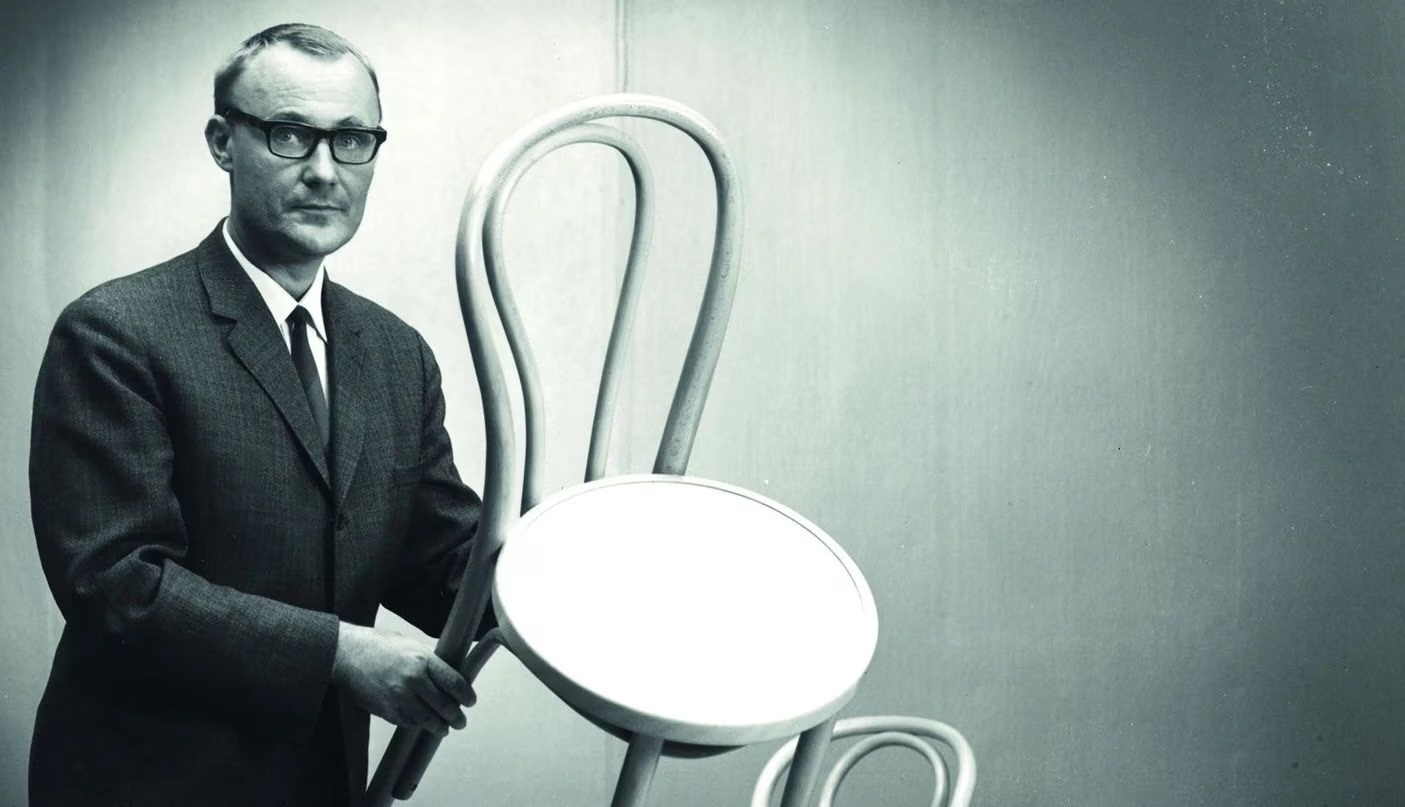“The Testament of a Furniture dealer” - IKEAs Timeless Handbook on Values and The Visionary Legacy of Ingvar Kamprad

"Only while sleeping one makes no mistakes. Making mistakes is the privilege of the active — of those who can correct their mistakes and put them right."
– Ingvar Kamprad (1926-2018)
Six years after his passing on January 27th, 2018, Ingvar Kamprad's vision and values continue to steer IKEA. His 1976 testament and 1996 dictionary laid out principles that fuelled IKEA's growth from a small business to a global furniture icon. As we mark the anniversary of Kamprad's death, his wisdom on leadership, serving people, embracing humility, and simplicity remains as relevant as ever. These documents were not fixed manifestos, but living guides that still motivate and inspire. By revisiting Kamprad's own words, we reconnect with the human core of IKEA's brand - the deeper purpose beyond products and profits. Though Kamprad is no longer with us, his voice carries on.
From Humble Beginnings to Global Impact
IKEA’s beginnings were marked by trials, yet Kamprad persevered. After first selling pens and watches, he pivoted to fill a wider need - stylish, affordable, ready-to-assemble furniture fit for modern life. This shift revealed Kamprad’s ability to spot and respond to what shoppers truly wanted. Soon enough, traditional furniture giants fought back.
Boycotts spearheaded by the traditional furniture industry posed an existential threat to IKEA's early survival. With sales rapidly climbing from 100,000 to 600,000 euros in just three years, IKEA risked losing its product pipeline if suppliers were intimidated into abandoning Ingvar Kamprad’s rebel outfit.
“The boycott only made us stronger, and the crisis became a non-crisis as we were constantly coming up with new solutions.”
Yet true to his stubborn Smålander roots, Kamprad refused to cave. As he later reflected, “The boycott only made us stronger.” Barred from buying the same mass-produced furniture as his rivals, Kamprad leaned into IKEA’s underdog status - finding creative workarounds and forging bonds with like-minded suppliers willing to violate the boycott through backchannels. Orders were rerouted, new company identities woven, and Ingvar himself went straight to factories to source discontinued items and forge production relationships based on personal trust.
The boycott ultimately failed because, in Kamprad’s words, “the crisis became a non-crisis as we were constantly coming up with new solutions.” Innovation was born of necessity, forcing IKEA to differentiate itself through in-house designs. Kamprad found opportunity in obstruction, channeling his grit into inventing creative loopholes that kept IKEA afloat while fueling its unique and evolving aesthetic vision focused on affordability. What began as an existential threat only clarified IKEA’s rebel purpose.
The Kamprad Philosophy: A Blueprint for Leadership
Kamprad’s vision and beliefs live on through two key IKEA documents - his 1976 Testament and 1996 business “bible”. These texts capture his deeply-held principles for leadership and success. More than historical records, they read like a manifesto of a mission-driven community. IKEA still uses them today to steer the company. The ideas shape IKEA’s culture and operations as a model of sustainability and customer care.
Below are 7 leadership principles that you will find in the documents;
1. Serve the Many
“We have decided once and for all to side with the many. What is good for our customers is also, in the long run, good for us. This is an objective that carries obligations.”
Kamprad's IKEA was built on the principle of serving "the many people" with affordable, functional furniture, democratizing good design. This vision would be achieved through the company’s business idea: “by offering a wide range of well-designed, functional home furnishing products at prices so low that as many people as possible will be able to afford them”. Kamprad believed that the product range is the identity of the company and it should reflect the simplicity and straightforwardness of IKEA.
2. Embrace Humility
“A nice word, though often misused. More than anything else, it (humbleness) really means respect.”
True humility means respect - for competitors, coworkers, customers, and the tireless work behind IKEA's success. It's listening more than talking. Expecting criticism and acting on it. Admitting weaknesses and blind spots. Letting go of ego to serve others. Success cannot intoxicate humility's grounded wisdom. Humbleness manifests through consideration, generosity, sincerity. It's the antidote to envy. The foundation for improvement. Key to lasting victories where no one loses. Kamprad realized humility makes space for people to create value. It doesn't feign kindness by avoiding hard truths, but speaks plainly from care. IKEA's humility withstands the winds of praise and blame alike - not by keeping a low profile, but staying grounded in service.
3. Empowerment Through Delegation
“The fear of making mistakes is the root of bureaucracy and the enemy of development”
Kamprad realized an expanding company can't precisely define every role. Better to accept fluidity, delegate responsibility amidst growth, and empower others over processes. For him, mistakes were the privilege of the dynamic - a sign of potential and courage to lead.
Rather than demanding credentials, IKEA rewards willingness and ability to take ownership when given autonomy. Kamprad promoted promising talent even lacking experience. He knew progress requires having the courage to empower people over perfect plans.
This principle of empowerment through delegation enabled many young co-workers to rapidly gain responsibilities most companies would never allow. Kamprad created space for leaders to rise and fall on their grit and care for the team.
4. Simplicity as a Virtue
“exaggerated planning is the most common cause of corporate death.”
True simplicity is efficiency and common sense - doing what comes naturally, not what's most complicated. It's embracing progress while cutting clutter and distraction. Simplicity means clear communication, short instructions, and helping people understand the why behind their work. It's talking face-to-face before firing off emails. Simple can mean cost-conscious, but not always - bad presentations waste money and time regardless of fancy visuals. Kamprad realized simple solutions consider wider contexts and real needs. Simplicity demands respect. At IKEA, simple habits and actions model cost-consciousness. But they never judge others' choices outside work. Kamprad knew simplicity avoids disconnected rules, not modern tools. It removes barriers more than things. His simplicity was understanding people, then serving their needs - however different - as efficiently as possible.
5. Relentless Cost Management
“Expensive solutions to any kind of problem are usually the work of mediocrity.”
Kamprad believed in leading a frugal lifestyle, which was reflected in his personal habits such as flying economy, not staying at luxury hotels, recycling teabags, buying secondhand clothing, driving a 1993 Volvo estate, and doing his own grocery shopping.
At IKEA, focus on cost-cutting without compromising quality ensured they could offer value unmatched in the market. Kamprad believed that achieving good results with small means was crucial for IKEA’s success. To achieve this, Kamprad focused on production efficiency and logistics constraints, which posed hard restrictions on the furniture designers. This approach was new to the industry, but it made the products affordable to a broad market. One such constraint was that the flat package had to fit on a standard European pallet.
6. Fearless Experimentation
“If we from the start had consulted experts about whether a little community like Älmhult could support a company like IKEA, they would have undoubtedly advised against it.”
Kamprad realised progress demands daring to attempt the yet-unproven. Experience can excuse inaction, but breakthroughs often come from fresh eyes. Failure is fuel for better approaches, not judgement. "Never say never" was Kamprad’s motto - trying again with wisdom gained.
Fear of mistakes kills innovation. Kamprad fostered a culture encouraging initiative, trusting youth, and weighing indirect costs of missed opportunities. Responsibility comes with the freedom to err. Explain why, then correct course. No perfection needed to progress.
With most things still undone, boredom is the greater risk than failure. Happiness, Kamprad knew, lies in the striving - not just the goal. "Impossible" was deleted from IKEA's dictionary. Time too precious to waste paralyzed from acting.PROGRESS
Kamprad led by his humble willingness to try, learn, and try again. He created space for others to do the same on IKEA’s restless journey always seeking better. The magic was empowering experimentation rooted in personal accountability, understanding, and care.
7. Focused Efforts for Maximum Impact
“The general who divides his resources will invariably be defeated.”
Kamprad understood real impact requires strategic concentration, not diluted efforts chasing every opportunity. As in war, dividing resources risks defeating even the strong. IKEA focuses strengths in select areas - our own unique profile, key markets, specific customer needs. We go all in where it matters most.
This tight focus demands humility - recognizing we can't satisfy all tastes or conquer everywhere at once. It means "making do" with less in some areas to invest fully in those vital few. Concentration builds self-reliance by extracting maximum impact from minimum viable means.
The word itself, concentration, implies power. Kamprad concentrated resources for breakthroughs, then relied on co-workers' loyalty to manage trade-offs. Laser focus on core priorities guides IKEA still today. By consciously targeting high-impact efforts, Kamprad turned limitations into discipline and lasting influence.
Invitation to Reflection and Action
Nearly five decades after being put to paper, Ingvar Kamprad’s visionary principles remain a living blueprint for effective, compassionate leadership today. As we mark the anniversary of Kamprad’s passing, we are reminded of the profound global impact inspired by one person’s dedication to democratising access, sustainability, and human-centered solutions.
IKEA’s ongoing journey stands as a testament to the power of ethical business practices centred on humility and service to others. And Kamprad’s legacy invites us to reflect on applying such lessons however we can - through our individual choices and collective influence in the world. His words carry an urgent reminder for us to champion inclusivity, steward resources wisely, and lead with care for the many rather than personal status.
The simplest yet most enduring innovations often meet basic human needs. As Kamprad demonstrated, true progress uplifts more than it uproots. It sees existing constraints as opportunities to better support people’s wellbeing. May we take inspiration from his bold, yet caring, spirit and find our own way to carry forward the vision so uniquely sparked in Älmhult yet made globally brighter for decades to come. For in uplifting the lives of the many, we uplift the entire world.
What do you think?
Do you think IKEA is still living up to the values of Ingvar Kamprad? What do you think about the leadership principles? Let me know - get in touch.
